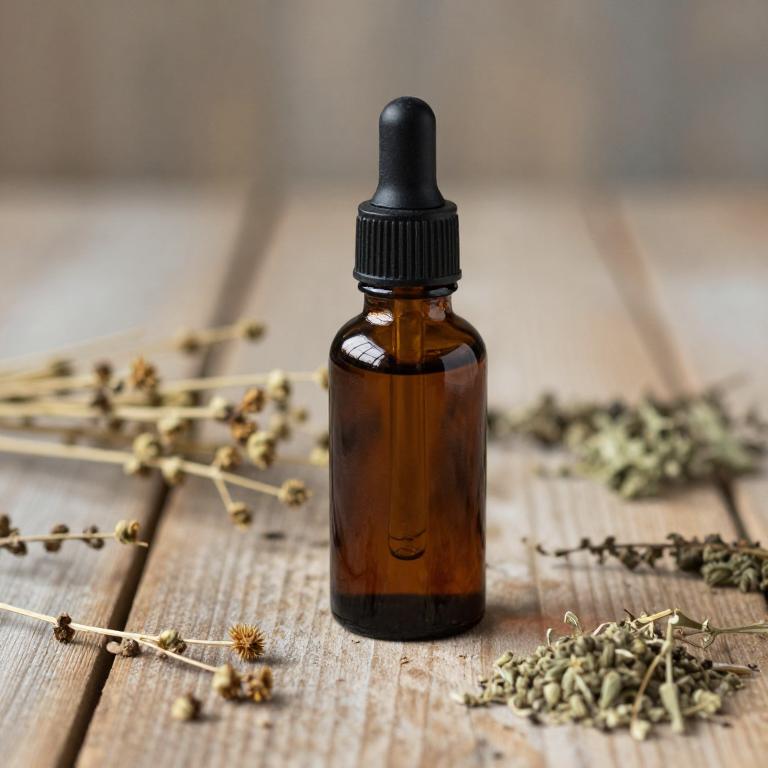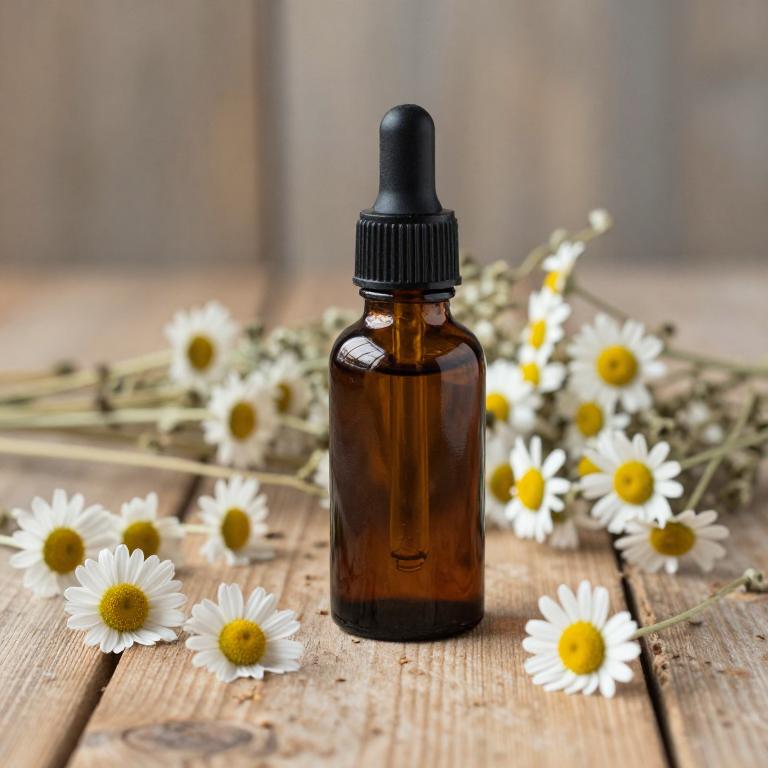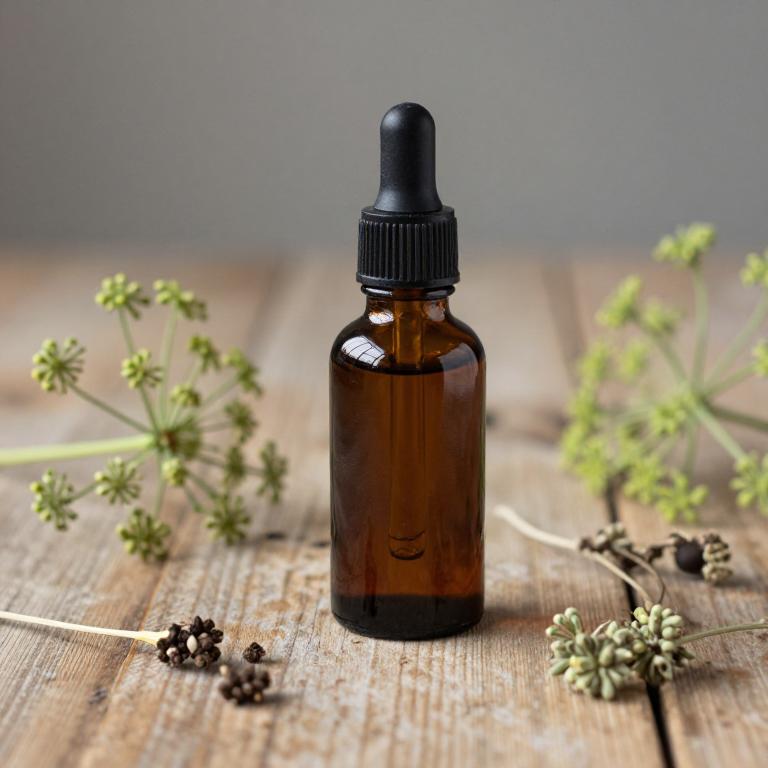10 Best Herbal Tinctures For Bloating

Herbal tinctures offer a natural approach to alleviating bloating by harnessing the digestive and anti-inflammatory properties of various plants.
Commonly used herbs include ginger, fennel, peppermint, and dill, which are known to soothe the digestive system and reduce gas and discomfort. These tinctures are typically prepared by steeping the dried herbs in alcohol, allowing the active compounds to be extracted for easy absorption. They can be taken orally in small doses, either before meals or as needed, to support digestive health.
While generally safe, it is advisable to consult a healthcare professional before using herbal tinctures, especially for individuals with existing medical conditions or those taking other medications.
Table of Contents
- 1. Fennel (Foeniculum vulgare)
- 2. Thistle (Silybum marianum)
- 3. Turmeric (Curcuma longa)
- 4. Cumin (Cuminum cyminum)
- 5. Chamomile (Matricaria chamomilla)
- 6. Dog rose (Rosa canina)
- 7. Ginger (Zingiber officinale)
- 8. Anise (Pimpinella anisum)
- 9. Stinging nettle (Urtica dioica)
- 10. Licorice (Glycyrrhiza glabra)
1. Fennel (Foeniculum vulgare)

Foeniculum vulgare, commonly known as fennel, is a widely used herb in traditional medicine for its digestive benefits, particularly in alleviating bloating.
Fennel tinctures are concentrated herbal extracts that can be easily incorporated into daily routines for digestive support. The essential oils in fennel, such as anethol, have antispasmodic and carminative properties that help reduce gas and ease gastrointestinal discomfort. When taken in appropriate doses, fennel tinctures may promote smooth muscle relaxation in the digestive tract, thereby reducing bloating and improving overall digestion.
However, it is important to consult a healthcare professional before using fennel tinctures, especially for individuals with existing medical conditions or those taking medications.
2. Thistle (Silybum marianum)

Silybum marianum, also known as milk thistle, is a herbal remedy commonly used in tincture form to support liver health and reduce bloating.
The active compound, silymarin, is believed to have anti-inflammatory and antioxidant properties that may help alleviate digestive discomfort. Herbal tinctures made from Silybum marianum are often taken orally, typically diluted in water or juice, to ease the digestive process. These tinctures may help reduce gas, improve digestion, and support the body’s natural detoxification processes.
However, it is important to consult a healthcare professional before using these tinctures, especially for individuals with existing medical conditions or those taking other medications.
3. Turmeric (Curcuma longa)

Curcuma longa, commonly known as turmeric, is widely used in herbal tinctures for its anti-inflammatory and digestive benefits.
These tinctures contain curcumin, a bioactive compound that helps reduce intestinal inflammation and improve gut motility, which can alleviate bloating. Turmeric tinctures may also support the production of digestive enzymes, aiding in the breakdown of food and reducing gas buildup. Due to its natural properties, curcuma longa tinctures are often recommended as a complementary therapy for digestive discomfort.
However, it is important to consult a healthcare provider before use, especially for individuals with existing medical conditions or those taking medications.
4. Cumin (Cuminum cyminum)

Cuminum cyminum, commonly known as cumin, is often used in herbal tinctures to help alleviate bloating due to its carminative and digestive properties.
These tinctures work by promoting the movement of gas through the digestive tract, reducing discomfort and pressure in the abdomen. The essential oils in cumin, such as limonene and cineole, contribute to its effectiveness in easing digestive distress. When taken in moderation, cumin tinctures can support healthy digestion and reduce the frequency of bloating episodes.
However, it is advisable to consult with a healthcare professional before using cumin tinctures, especially for individuals with existing medical conditions or those taking other medications.
5. Chamomile (Matricaria chamomilla)

Matricaria chamomilla, commonly known as chamomile, is a popular herb used in tinctures to address digestive issues such as bloating.
The tincture form allows for easy absorption and consistent dosing, making it a convenient option for those seeking natural remedies. Chamomile contains compounds like apigenin and bisabolol, which have anti-inflammatory and antispasmodic properties that can help reduce gastrointestinal discomfort. It works by relaxing the muscles in the digestive tract and reducing gas and bloating.
When used as directed, chamomile tinctures can provide gentle relief from bloating without the side effects often associated with pharmaceuticals.
6. Dog rose (Rosa canina)

Rosa canina, also known as rose hip, is a traditional herbal remedy that has been used for centuries to support digestive health and alleviate symptoms of bloating.
The tinctures made from Rosa canina berries are rich in essential nutrients, including vitamin C, antioxidants, and anti-inflammatory compounds, which can help reduce gastrointestinal discomfort. These tinctures are often recommended for individuals experiencing bloating due to their ability to support healthy digestion and reduce gas buildup in the intestines. The mild and pleasant taste of Rosa canina tinctures makes them a popular choice for those seeking natural remedies for digestive issues.
Regular use of Rosa canina herbal tinctures may contribute to overall digestive wellness and help manage bloating effectively.
7. Ginger (Zingiber officinale)

Zingiber officinale, commonly known as ginger, is widely used in herbal tinctures to alleviate bloating due to its anti-inflammatory and carminative properties.
These tinctures work by stimulating digestion and reducing gas buildup in the gastrointestinal tract. The active compounds in ginger, such as gingerol and shogaol, help relax the muscles of the digestive system, easing discomfort associated with bloating. When taken in appropriate doses, ginger tinctures can provide a natural and effective remedy for mild to moderate digestive discomfort.
However, individuals with certain health conditions or those on medications should consult a healthcare professional before use.
8. Anise (Pimpinella anisum)

Pimpinella anisum, commonly known as anise, is a herb often used in herbal tinctures to alleviate bloating and digestive discomfort.
The tinctures are made by extracting the essential oils and active compounds from the dried seeds of the plant, which contain compounds like anethole and estragole known for their carminative and antispasmodic properties. These tinctures work by relaxing the smooth muscles of the gastrointestinal tract, reducing gas and cramping associated with bloating. They are typically taken in small doses, often diluted in water or another liquid, to avoid potential side effects.
Due to their soothing effect on the digestive system, anise tinctures are a popular natural remedy for occasional digestive upset and bloating.
9. Stinging nettle (Urtica dioica)

Urtica dioica, commonly known as stinging nettle, is a powerful herbal remedy often used in the form of a tincture to address digestive issues such as bloating.
The tincture is typically made by soaking the dried leaves and stems of the plant in alcohol, allowing the beneficial compounds to be extracted. Stinging nettle is rich in minerals like potassium, magnesium, and iron, which can help reduce water retention and ease gastrointestinal discomfort. Its anti-inflammatory and detoxifying properties may support healthy digestion and reduce the sensation of bloating.
When used as a tincture, it is often recommended to start with a low dose and gradually increase to avoid potential irritation from its mild stinging compounds.
10. Licorice (Glycyrrhiza glabra)

Glycyrrhiza glabra, commonly known as licorice root, is a popular herbal remedy used in tincture form to address digestive issues such as bloating.
The tincture works by soothing the gastrointestinal tract and reducing inflammation, which can help alleviate discomfort caused by gas and excess stomach acid. It contains compounds like glycyrrhizin, which have demonstrated antispasmodic and anti-inflammatory properties. However, long-term use of licorice root tinctures may lead to side effects such as hypertension due to its effect on aldosterone levels.
As a result, it is often recommended to use licorice root tinctures under the guidance of a healthcare professional, especially for individuals with pre-existing health conditions.